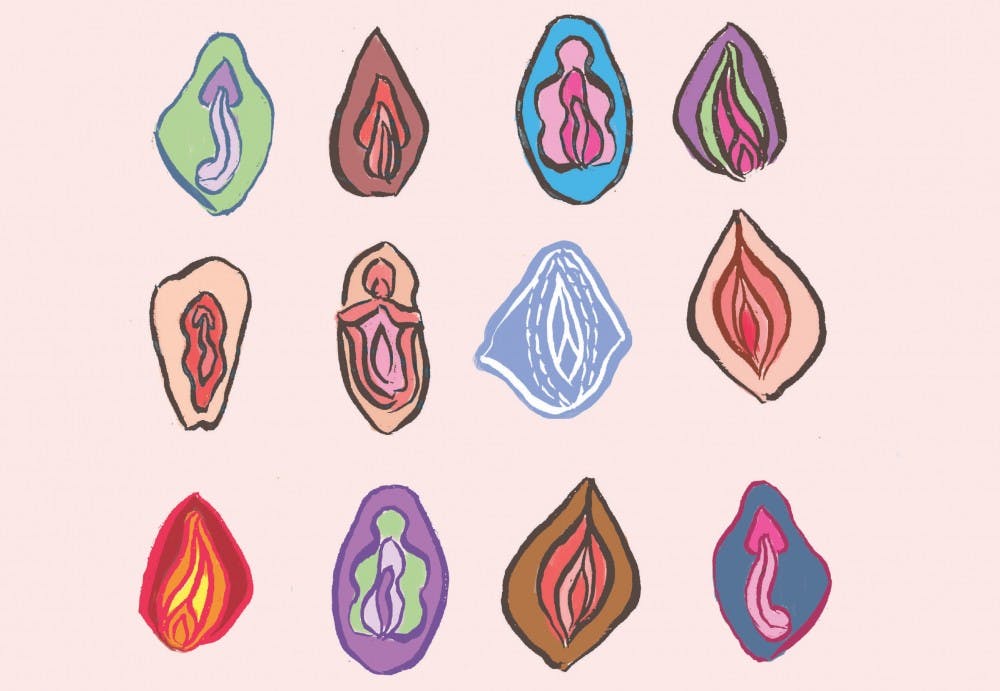"I must tell you that up until this point, everything I knew about my vagina was based on hearsay or invention. I had never really seen the thing. It had never occurred to me to look at it. My vagina existed for me on some abstract plane."
It's not secret that there’s a general aversion to discussing vaginas. They are regarded as a cultural taboo, and certainly not suitable for casual conversation. The above quote is from Eve Ensler’s famous play, “The Vagina Monologues.” In this scene, a woman recalled her experience at what she identifies as “The Vagina Workshop.” Prior to the workshop, the narrator had chosen to completely ignore her vagina. To her, it seemed like a foreign object that wasn’t actually attached to her body. Although this monologue was humorous and somewhat extreme, it is increasingly relevant today in a society where vaginas are often regarded as dirty, embarrassing and shameful. “The Vagina Monologues” confronts the societal reluctance to have an open conversation about female genitalia.
Second-year co-director and fourth-year veteran of “The Vagina Monologues” Dayna Smith emphasized the cultural relevance of the piece.
“It elevates women’s voices,” Smith said. “That’s the foremost and most important thing that Eve Ensler has been doing for 30 years. Prior to that, women weren’t allowed to talk about themselves, especially about their vaginas.”
“The Vagina Monologues” first debuted in 1996 at the HERE Arts Center in New York City. It is comprised of episodes performed by a varying number of female cast members. Ensler originally performed every monologue herself, but it has since expanded to typically feature 10 to 15 women.
Feb. 24 was opening night of “The Vagina Monologues” at Tapp’s Art Center on Main Street. Tapp’s hosted three consecutive nights of the performance, and all revenue benefited Sexual Trauma Services of the Midlands. Eleven women performed 18 monologues to an intimate group of a mostly female audience.
Heather Jones, an attendee of the event, has seen a performance of “The Vagina Monologues” every year since she first saw the performance in college.
“I think that there is not enough conversations about the topics that they discuss,” Jones said. “I wish more people came. I wish more than women came. There are some guys, but I wish it were a little more diverse because it is an important conversation. Knowing that there are other people out there who have the same questions about vaginas is comforting.”
To create the monologues, Ensler interviewed over 200 women about their experiences surrounding sex, love, masturbation, birth, menstruation, orgasms and many other elements of the female experience. In addition, she asked each woman “If your vagina got dressed, what would it wear?” Some answers included “a tutu,” “see-through black underwear,” “a taffeta ball gown,” “something machine washable” and “Armani only.” Women were also asked, “If your vagina could talk, what would it say?” Some responses included “slow down,” “enter at your own risk” and “Where’s Brian?”
The monologues also addressed serious issues such as rape and female genital mutilation. An episode titled “My Vagina Was My Village,” performed by Ashley Chonka, is based on a group of women’s experiences during the Yugoslav Wars. It is one of the systematic rapes of Bosnian women refugees as a wartime strategy. There was a strong and unnerving contrast between the pleasure and pride one woman took in her body and the disassociation and numbness she felt after she was assaulted in a refugee camp.
“There’s a dead animal sewn in down there with thick black fishing line. And the bad dead animal smell cannot be removed. And its throat is slit and it bleeds through all my summer dresses,” she said.
For every serious episode, there was a monologue that elicited loud laughter from the audience. “My Angry Vagina” is one woman’s rant about all of the torturous items women are expected to be OK with inserting into their vaginas. The list ranged from tampons to vaginal speculums. The narrator made several helpful suggestions to improve interactions at the gynecologist such as soft velvet robes, pink gloves and fur-covered stirrups.
“The Vagina Monologues” is widely regarded as a piece of modern feminist art — but not without controversy. It has received criticism for a negative and narrow view of heterosexual sex. Feminist scholar Wendy McElroy suggested that the play is misandrist in nature and has a one-sided approach to sexuality. In “The Little Coochie Snorcher That Could,” arguably the most controversial episode of the monologues, a woman chronicles her tumultuous childhood experiences. When she was 13 years old, an older woman provided her with alcohol and seduced her. The teenager later attests, “Well, I say if it was rape, it was a good rape.” This line was removed from later versions, and the narrator’s age was changed to 16 years old.
However, the beauty of “The Vagina Monologues” is that it is not concrete. Teagan Shelton, a first-year monologues performer, commented on the numerous episodes that have been added to the performance since its conception.
“It’s really evolving and it’s beginning to be way more inclusive,” Shelton said.
“The Vagina Monologues” is the basis of V-Day, a global movement with the objective of ending domestic violence. Lauren Goodnight, a co-director of “The Vagina Monologues,” explained that Sexual Trauma Services of the Midlands has partnered with “The Vagina Monologues” in previous years. “Getting involved in your community is important, not just for the people you work with,” Goodnight said. “It’s the people who are touched by what you do.”
“Right now feminism, science and common sense are under attack,” Goodnight said. “To perform a piece so strongly associated with female biology is an act of defiance.”



